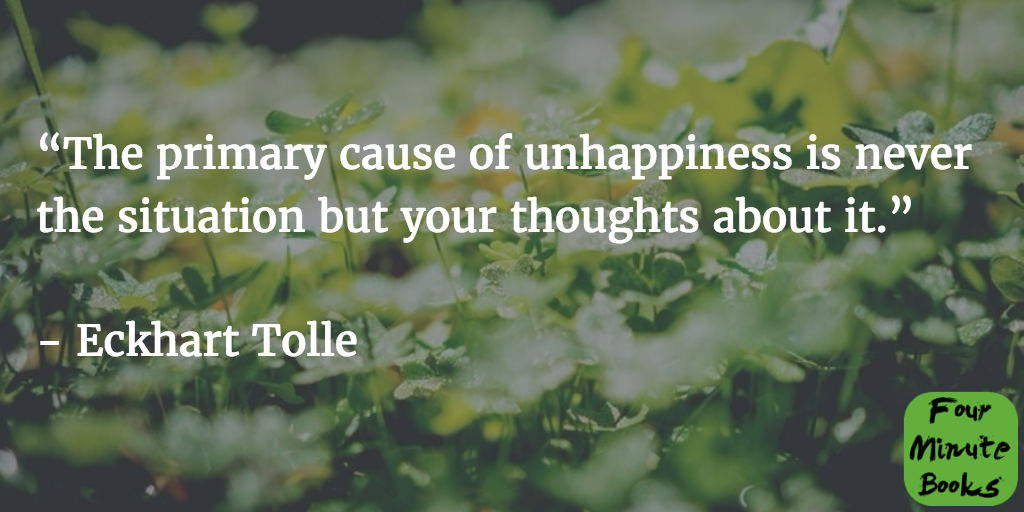1-Sentence-Summary: A New Earth outlines a crazy and destructive place we call home, but not without showing us that we can all save it together, by looking into our minds and detaching ourselves from our ego, so we can practice acceptance and enjoyment.
Read in: 3 minutes
Favorite quote from the author:

Audio Summary
Listen to the audio of this summary with a free reading.fm account:
You most likely know Eckhart Tolle from his book The Power of Now, so I bet you’ll be surprised to hear that A New Earth sold almost twice as many copies. This might have been mostly due to Oprah selecting it for her book club, which led to a series of 10 webinars with her and Tolle, which 35 million people attended (around 10% of which in turn bought the book).
Nonetheless, this book describes some of the central problems humanity faces today and gives individuals like you and me a place to start changing that.
Here are 3 lessons from A New Earth to help you make the world a better place, by making your mind a better place:
- Religion won’t help us save the world, because it always carries part of the problem.
- Be a duck – don’t overthink things.
- Acceptance leads to enjoyment, which is the only way to an enlightened life.
Wanna come and save the planet? Let’s think ourselves to a better earth!
Lesson 1: Religion won’t help us save the world, because it always carries part of the problem.
Tolle first describes that all religions already accept pain, chaos, madness and suffering as part of life in one form or the other. Therefore, religion can’t possibly solve the problem.
Buddhism, for example, mentions dukkha as the mind’s natural state, which translates to suffering or pain. If you translate “sin” from its original, Greek source, it comes out to “missing the mark.” Thus, Christianity also has its own bucket for those, who are lost causes and just miss the point. Hinduism integrates death and rebirth into a perpetual cycle of pain and relief.
You see, turning to religion, no matter which one, can’t possibly truly liberate us.
Most of these problems with religion have emerged over time, because as religions grew older, their messages have been twisted, changed and distorted, making them part of the problem, instead of the solution. Just think of the Crusades, Spanish Inquisition, or the Israeli-Palestinian conflict.
Lesson 2: Overthinking is detrimental, so be like a duck.
Tolle uses a cool Zen story to make this point.
Tanzan and Ekido, two Buddhist monks, travel along a muddy road, while heavy rain is falling. They spot a beautiful woman in a kimono, who’s unable to cross an intersection, because of the bad weather. Tanzan picks her up and carries her to the other side, setting her down. They travel on for hours, and only when they reach their destination at night does Ekido speak about what’s been bothering him the entire time: “We monks aren’t allowed near females, so why did you do that?”
Tanzan replies: “I left the girl there. Are you still carrying her?”
So simple, but perfectly makes the point. Tolle compares someone, who doesn’t overthink, to a duck. When ducks fight, they quickly swim in opposite directions afterwards, immediately moving on with their lives.
Only humans feel compelled to collect bad feelings, resentment, hurt and suffering over time and then unleash it upon the world.
Don’t be like Ekido. Don’t carry things with you longer than you need to. Be like a duck.
Lesson 3: You can live an enlightened life only through enjoyment, which you can find by accepting things as they are.
So here’s the solution Tolle proposes: Accept every moment as it is. Do whatever you have to do in any given moment, but do it peacefully, without judgement and keep an open mind.
Not all tasks are great, not all days will be wonderful, but once you simply accept what you’re doing, you take responsibility for your own state of mind and can find enjoyment in the present.
The more you seek to find this enjoyment in your life, the more it’ll become your source of motivation for doing things, instead of a desire for some material thing or other peoples’ approval.
Always acting out of pure enjoyment is what Tolle describes as enlightenment, and acceptance is the only way to get there.
A New Earth Review
I think A New Earth was even more successful than Tolle’s first one is that it works with the concepts he previously described, but places them in a much larger context. Not only are his ideas about living in the present the key to your own happiness, but they just might help us all make the world a better place.
I’d suggest you read the free preview on Amazon and then make up your mind. Tolle is known for being a complicated read, so the blinks might help you understand this book a lot better and thus make a good supplemental read.
Who would I recommend the A New Earth summary to?
The 13 year old, who’s supposed to go to Confirmation in a year, the 33 year old stock broker, whose day is often ruined when he ends the it in the negative, and anyone who thinks their job involves doing lots of things they don’t like.
Last Updated on August 1, 2022